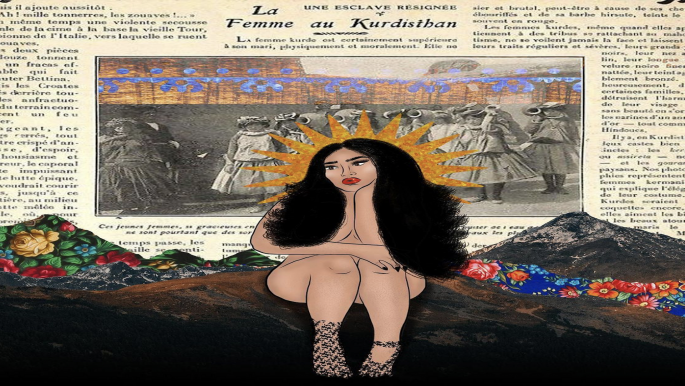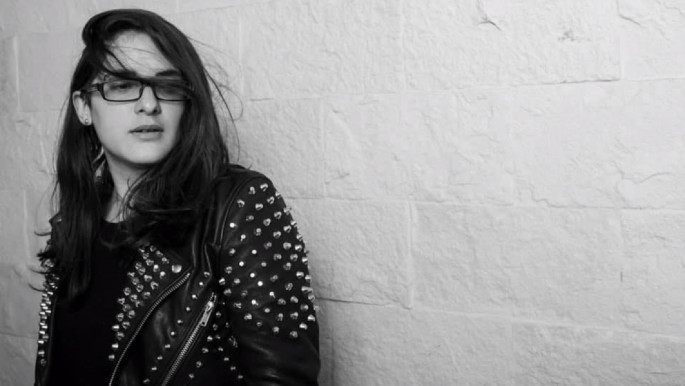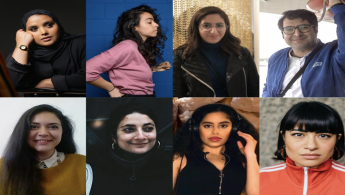Breaking through the stereotypes: New arts organisation seeks to shift representation of MENA artists
The narrative having been focused on stereotypical portrayals of people from MENA as "terrorists" or "illegal immigrants", it's time for a shift, says the organisation, which has the long-term vision of connecting diasporic artists to opportunities and lobbying the industry for appropriate representation.
It also sought to reclaim space within arts and culture by retelling stories from the perspective of MENA+ artists through a campaign involving eight short films on the subject: How should the MENA+ arts community celebrate what we have in common?
Films came back in various guises with the final shortlist including Mrs El Araby, a film exploring the restricted space within which Arab women are allowed to exist in white Western media.
Or, Unveil Your Eyes, the expression of the experience of a deaf refugee moving to the UK, acknowledging they still see their life and their hometown of Birmingham through the lens and experiences of being brought up in Iran and the Middle East.
Others among the final eight films included Kiss Between Our Borders by Yemeni-Scouse poet Amina Atiq, The Art of Uprising, by Peyvand Sadeghian, A Cube In Love by Majid Adin, Third Culture Glitch by Jida Akil and Intimate Births by Bint Mbareh.
 |
|
| Read also: ReBirth: Women in Iraq blend feminism with digital art |
Nooriyah Qais's Darbouka also made it to the campaign launch, her film depicting a physical conversation between three Middle Eastern and North African dancers in different parts of the world.
The three dancers practice three different dance disciplines that express alternative parts of their identity but who unite through the darbouka (drum), which Qais describes as the "heartbeat of the region".
"I wanted to show the beautiful diversity of our identities that are often viewed as homogeneous and painted with the same brush," says Qais, a DJ, presenter and filmmaker who often pays homage to her heritage.
"It was also my own humorous response to how MENA music is often dubbed as 'belly dance music' and the confines of this stereotype," Qais tells The New Arab.
 |
I wanted to show the beautiful diversity of our identities that are often viewed as homogeneous and painted with the same brush |  |
Self-taped in Paris, Sidon and New York, the dancers were given a small brief to make the film visually cohesive but with lots of room for them to inject their own creativity and identity, Qais says, selecting Habibitch, a ballroom dancer passionate about decolonising the dancefloor, Reem Naamani, a contemporary and classical ballet dancer from Lebanon and Esraa Warda, a performer and educator showcasing Moroccan and Algerian dance around the world.
"Every idea that was pitched for our competition was brilliant in its own way – I wish we could've commissioned them all," said Sepy Baghaei, an Iranian theatre director who serves as Co-Vice Chair for MENA Arts UK.
"In the end, the judges and I picked these films based on the range of forms and themes they covered. There's animation, music, dance, poetry, comedy and installation. They transcend stereotypes through the themes they cover: examining diaspora journeys, representations of women, mythology and storytelling, and the different lenses through which we experience the world," she says.
Baghaei helped launched the organisation last year, delivering their strategy with 13 volunteers who are all MENA+ and working in the live and recorded arts.
Judges on the film campaign included accomplished industry professionals like British-Egyptian playwright and poet Sabrina Mahfouz, Palestinian-Irish playwright Hannah Khalil and Palestinian-British filmmaker Saeed Taji Farouky.
Part of MENA Arts UK's ongoing efforts include a free fortnightly newsletter with opportunities, a website directory for artists and regular online town hall events where recent talks have included 'But You Don't Look Middle Eastern: A Discussion on MENA+ identity'. The time over the past year has essentially been used to prepare the ground for post-lockdown.
"Having been in lockdown for the past year, it's been fascinating to observe the range of conversations taking place around diversity and inclusion – not just for the MENA+ community, but all marginalised groups. Those conversations were pushed to the side in 'normal times' pre-Covid – but suddenly, with all the free time that we had during the early lockdowns, there were lots of Zoom panels and discussions popping up," says Baghaei.
These discussions covered how freelancers are currently treated in the industry, accessibility when in-person attendance may not always be possible and what needs to change when the live and recorded arts open up again, in terms of who and what we see on and off screen and stage.
"These conversations were hard, but they were progress. It's in this spirit that MENA Arts UK came about. The real challenge will be when our industries return to some sort of 'normal' – and making sure we implement all the learning that we've done over the past year," says Baghaei, admitting that breaking through the stereotypes and "the stories of war, oppression and persecution that we are all-too-familiar with and exhausted by" won't be easy.
And with negative and inaccurate stereotypes existing around all marginalised groups, Baghaei says MENA Arts UK is ever-aware of ensuring they are not taking space away from other marginalised communities but working alongside them to ensure strength together.
"Culture change across arts and cultural institutions is vital, increasingly so in the current climate, where we are seeing the significant impact of social injustice and Covid-19 on disadvantaged communities," says Abid Hussain, Director of Diversity at Arts Council England (ACE).
"More work needs to be done to develop more inclusive organisational cultures that encourage and foster a greater sense of belonging for all staff and board members, irrespective of their backgrounds."
 |
Breaking through the stereotypes and 'the stories of war, oppression and persecution that we are all-too-familiar with and exhausted by' won't be easy |  |
For its part, ACE has available open access National Lottery Project Grants and Developing Your Creative Practice programmes to help overcome funding challenges.
 |
|
| Read also: These BAME female DJs are smashing boundaries of social and institutional gender inequality |
It also launched strategic interventions like the Elevate, Change Makers and Transforming Leadership programmes to allow direct investment in the development of the resilience, profile and reach of individual leaders and diverse organisations, and has incorporated equality and fairness into its current 10-year strategy, Let's Create.
"As part of this strategy, we will require the organisations we invest in on a regular basis to address the issues of inclusivity and relevance. This will include setting appropriate and ambitious targets when it comes to improving diversity – across their workforce, leadership and governance – and increasing access to their work," he added.
However, Qais notes that it is important to help demystify grant application processes to make them as accessible as possible and notes challenges in the arts are intersectional.
For example, only 7 percent of female DJs were in the line-ups of 20 top festivals in 2018. That figure was 3 percent for ULTRA festivals, a popular electronic music event, regardless of the host country, with data for 2019 almost the same.
However, Qais says she converted the challenges of communicating her work into a tool of empowerment by finding new creative ways to showcase the beauty and diversity of MENA+ art and music in the UK and notes that things have moved on considerably over the years:
"I often get beautiful messages of women saying I can see myself doing this because you are and that is what representation is about."
Sophia Akram is a researcher and communications professional with a special interest in human rights particularly across the Middle East.
Follow her on Twitter: @mssophiaakram
Follow us on Facebook, Twitter and Instagram to stay connected


![President Pezeshkian has denounced Israel's attacks on Lebanon [Getty]](/sites/default/files/styles/image_684x385/public/2173482924.jpeg?h=a5f2f23a&itok=q3evVtko)



 Follow the Middle East's top stories in English at The New Arab on Google News
Follow the Middle East's top stories in English at The New Arab on Google News


